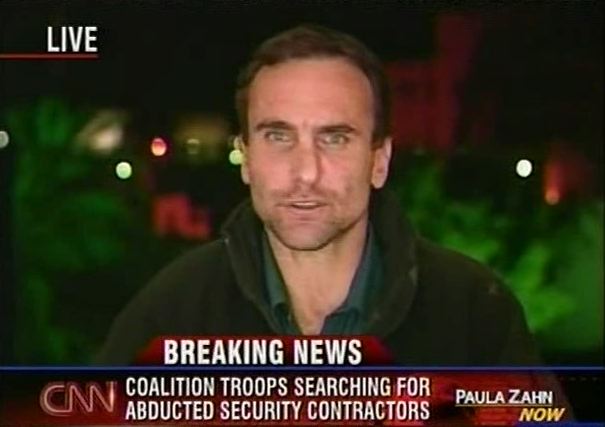PZN: More on the missing contractors

Click photo to play
Length: 4:15
PAULA ZAHN: Breaking news right now from southern Iraq, where a supply convoy has been ambushed. Four Americans have been kidnapped.
We get the very latest on this breaking story from Jamie McIntyre at the Pentagon, Michael Ware in Baghdad.
Let's get started with Jamie.
Do we have any idea who may have ambushed this convoy?
JAMIE MCINTYRE, CNN SENIOR PENTAGON CORRESPONDENT: No, we don't.
In fact, a senior Pentagon official, just a short time ago, cautioned me that he's not confident in the numbers they're getting back in this initial report.
Here's what they're hearing, though, that a civilian convoy leaving Kuwait was ambushed or hijacked near Nasiriyah. Apparently, there were supposedly 19 vehicles in the convoy. As a result of this incident, they're calling it, they're saying that as many as 14 people were abducted, including, it's believed, four Americans who were working for this Kuwaiti-based contracting company.
The incident took place in the southern part of Iraq, an area that was under British control, until it was recently turned over to Iraqi control. And Pentagon officials say that they believe the British forces are working with the Iraqis to try to figure out exactly what happened. And that's basically what we know at this point -- Paula.
ZAHN: Michael, fill us in on how tenuous that situation was, as you had the transfer of security over to Iraqi security forces.
MICHAEL WARE, CNN CORRESPONDENT: Yeah, essentially what happened is that the Brits and the Italians, who were running Dhi Qar Province, handed over all responsibility to security of that province to the Iraqis back in September.
So, that means that coalition forces have -- do not patrol, by and large, through the provincial capital or through the countryside. They're largely restricted to major logistic spaces, U.S.-operated, that serve the whole mission here in Iraq.
So, what has happened is that, when that control was passed, this is into an area which is heavily dominated by Shia militias. So, nothing of this kind of nature would be able to happen without the involvement of some kind of paramilitary forces dominant in the south -- Paula.
ZAHN: And, Michael, I know we're just beginning to get our first details nailed down here. But initial reports suggested that maybe some of those Shiite militia had disguised themselves at this checkpoint as Iraqi security forces.
WARE: That practice is as common as, you know, the sun rising in the morning, Paula.
I mean, this is what happens a lot in this country, that there will be flash checkpoints, illegal checkpoints, with militiamen, or insurgent groups, or even just petty criminals, posing as police, as army, or as national police commando forces.
It's also a way that the death squads can gain access to houses with less resistance, flashing legitimate or fake identification. I mean, this is a very, very common practice, to the point where, when you run into a checkpoint in this country, you honestly do not know exactly who you're about to deal with.
ZAHN: And, Jamie, give us a sense of what kind of shockwave is sent, whether the Pentagon can confirm these numbers or not, that potentially four American contractors have been kidnapped.
MCINTYRE: Well, again, Pentagon officials are saying to be very cautious about these first reports.
They have a saying here, that first reports are often wrong. They're not confirming any of those details, because, frankly, they're still trying to sort out exactly what happened. Again, it was not in an area where U.S. military forces were in direct control.
But just to build on what Michael Ware said, you know, kidnappings in Iraq are very common. It is a very lucrative criminal activity. Many of them are done not for ideological reasons, but simply to extract ransoms. And ransoms are often paid for the release of people. And that encourages more kidnappings.
So, we don't know what happened in this particular case. But it does appear, from the initial reports, that among those abducted were four Americans. And we may hear more later from the U.S. military, as they're scrambling to put together some sort of statement.
ZAHN: And, if you get that information, we will come back to you live.
Jamie McIntyre, Michael Ware, thanks.
